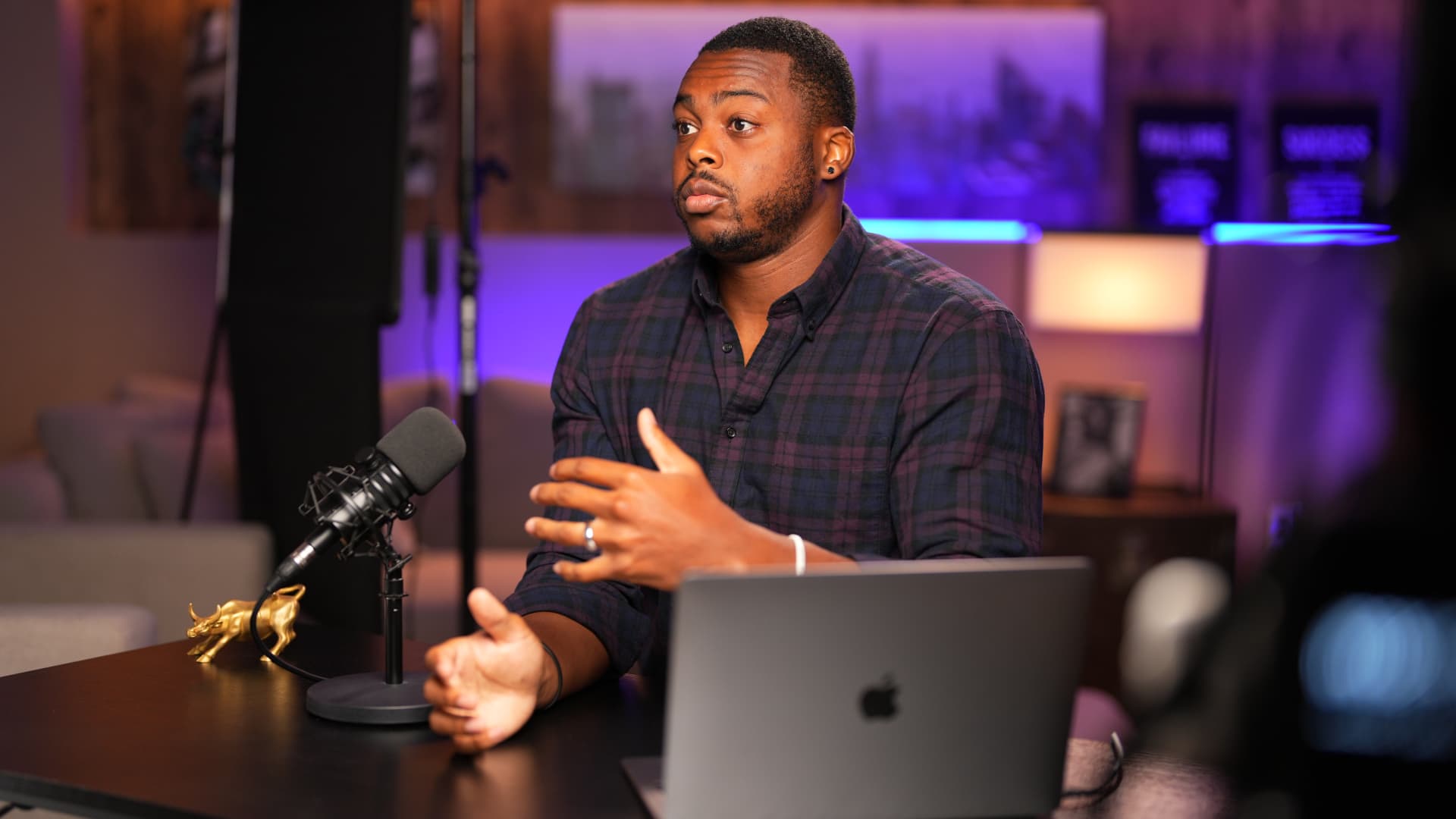
Michael Vilardo and Felix Ruano are living the American Dream. The son of Mexican immigrants, Ruano grew up in the inner city of Los Angeles and attended LA public schools before studying at Harvard University and eventually landing a job at McKinsey. Vilardo, whose family is from Colombia, was the first person from his high school to attend an Ivy. He started higher education in community college and attended seven schools in five years between high school and college, spending most of his time at the University of Pennsylvania where he earned his Bachelor's Degree. Vilardo later worked at Uber, where he helped launch Uber Freight.
Coming from similar backgrounds, Vilardo and Ruano noticed discrepancies between themselves and classmates at their respective Ivy League institutions. The resources their peers enjoyed and the mentors they were exposed to from an early age prepared them for professional success. Combining their experience in technology, education, and entrepreneurship — and leveraging the connections they formed in school and at work — they launched Emile Learning in October 2020, an online educational platform offering "bingeable" accredited courses which many students can access for free.
Their mission, providing a quality education to every student in the world, led to $5.3 million in angel investment from backers including Softbank, Owl Ventures, and Kleiner Perkins (which has backed two of the most successful online education companies, Duolingo and Coursera, both now public).
As Latino entrepreneurs, the young executives provide needed representation in a tech start-up scene dominated by white founders. Vilardo remains steadfast in his mission: "To help kids who look like the two of us."
Get Philly local news, weather forecasts, sports and entertainment stories to your inbox. Sign up for NBC Philadelphia newsletters.
Wealth, education and success
Vilardo attributes much of his success to the power of education and networking. He experienced firsthand how higher education, particularly at prestigious universities, opened new doors and connected him with mentors who would later be instrumental in growing his business and raising capital. His network at Uber played a transformative role in the company, as executives from the Uber Alum Syndicate invested in the start-up and connected Vilardo with Uber alumni. Of their first 40 employees, approximately 30% were from the ridesharing platform.
For Vilardo, education is the key to success, and Emile Learning aims "to help kids unlock any opportunity anywhere," because not everyone has access to an Ivy League education or a network at a major corporation with a market cap near $60 billion.
Money Report
"At the end of the day, what zip code you're born into or how much wealth your family has largely dictates your education and your education dictates your trajectory throughout life," Vilardo said. "We want to provide [someone from] any socioeconomic status or zip code with a top-tier education that is affordable. If we can empower anybody in the country and eventually the world to be able to access the best education, that is a monumental lift to society."
Many successful entrepreneurs seek to solve a problem they witness or experience firsthand. For Vilardo, this occurred early in the pandemic, when he was getting his MBA at UCLA and saw his university struggling to adapt to a digital learning environment.
"If top-tier universities could barely handle the transition to a digital world, how is a high school in North Dakota or Nebraska going to be able to handle it?" Vilardo said.
At first, Emile Learning tutored high-achieving students who wanted to improve their scores on AP exams and matriculate into top-tier colleges. But after Emile received accreditation for its courses, Vilardo and Ruano saw greater potential in the business.
Armed with coveted accreditation, they could provide school districts with classes for students of all backgrounds in both core subjects and extracurricular topics, empowering learners to graduate on time and access crucial curriculum (such as personal finance) that is rarely required in high school coursework.
Brandon Copeland, an NFL linebacker, personal finance instructor at the University of Pennsylvania, and a CNBC Financial Wellness Council member, chose to join the platform as both an investor and instructor because he appreciated the company's commitment to a diverse array of subjects.
"We're making sure young people have access not only to the traditional classes, the things we all learned in high school ... I'm focused on giving people real-life education, things that we're actually going to use in life, and so we're aligned in that mission," Copeland said.
Copeland says he was able to live his dream because he learned how to manage his money, control his resources, and practice financial wellness. At Emile Learning, he hopes to empower his students through financial education to live their dreams.
"When I think about real impact and building a legacy, being able to teach somebody about their money – how to use their money, how to maximize their money, how to make money – I personally believe that is something that will last with them. If you teach someone about their money, you not only change their life, but hopefully you change their children's lives, their family's lives, and their community," Copeland said.
When school districts began to receive Covid relief funding during the pandemic, some districts turned to Emile Learning, which had established digital infrastructure for remote learning. Now, public tax dollars are funding students' memberships, meaning many kids who lack the resources to purchase a membership can access HiEmile.com's courses for free.
"Public tax dollars are meant to be spent on improving educational opportunities in [less affluent] districts," Vilardo said. "The kids are able to enjoy our product with no charge, and that allows for us to be able to impact kids of any socioeconomic status who live in any zip code across the U.S."
Education is important now more than ever, Vilardo says, as students (especially those in less affluent districts) cope with the pandemic's impact on their education.
"Our main focus right now is helping all these students, especially those that have fallen behind during the pandemic," he said. "We're going to help them bridge that gap and be able to come out with more confidence after using our products."
A saturated online learning market
Many platforms stepped in during the pandemic to offer virtual education as traditional brick-and-mortar schools struggled to quickly build the digital infrastructure required for adequate online instruction. Outschool, for example, surged in popularity by offering an online marketplace for teachers to offer courses of their own creation over Zoom. Adults and children alike subscribed to Masterclass to access high-quality content taught by celebrities and industry experts. Kids flocked to YouTube not just for entertainment, but also for educational clips.
Despite a saturated market, Emile Learning differentiates itself by offering what few other platforms can: accreditation.
"We feel high conviction that [our] accreditation is a major differentiation," Vilardo said. "You can't apply to go to the University of Michigan watching YouTube or Masterclass. … With Emile, you absolutely can apply to go to college and earn validated credit."
More from Invest in You:
1 in 3 young adults will see an average $800 tax credit boost this year
The American dream of the middle class isn't what it used to be
These 'money disorders' may be crushing your budget
Copeland says the platform differentiates itself from similar products through its unique approach to delivering content.
"We're going to continue to differentiate ourselves by making sure that we're engaging our students in a unique way," he said. "We're trying to make sure we're using the hottest trends in technology and communication, to meet young people where they are, and not force them into the education system."
Vilardo says interacting with their content is like "watching your favorite Netflix documentary or docuseries. You can't go to bed at night and you have to watch the next episode. You're engaged, you're learning, and you're in that flow state of mind."
Like a docuseries, Emile's courses leverage high-quality production elements to capture viewers' attention. The courses are broken up into short, "bingeable" segments running 10 minutes or less, which Vilardo says will be critical in reaching the next generation of learners who are accustomed to digital technologies and fast-moving content.
"Kids who enter high school 10 years from now are going to be even more accustomed to learn in a digital first format," Vilardo said.
Combining accredited curriculum with movie-caliber production led the company to build its own production studio in LA and hire experienced producers and cinematographers in addition to instructors.
"You could very much compare [our courses] to what you see in the top-level screenwriters in the entertainment business," Vilardo said. "You have people building the scripts rigorously ... and working with very talented people who can bring that to light and have that evangelized throughout beautiful videography."
But it is the teachers who are the superstars of their company, Vilardo said. "They educate folks and produce more talent, which generates more gross domestic product. A more educated society means more opportunity for everybody involved," he added.

On-camera personalities are key to Emile Learning's success and appeal, and Emile Learning's digital, pre-recorded courses allow the company to attract talent.
"Peloton helped personal trainers – the best in the world – get compensated top of market and be leveraged by technology and media. We're doing [something] very similar with teachers and that's going to allow our partners to have more intimate instruction," Vilardo said. "Meanwhile, the teachers on-site can focus on the students falling behind or the students way ahead for more intimate instruction," he added.
Many technology companies that capitalized on people staying at home during the pandemic, including Peloton and Zoom, are suffering after having reached lofty market valuations. Demand has decreased with pandemic-era restrictions being lifted and people returning to in-person activities, but Vilardo says Emile Learning has even greater growth potential post-pandemic by filling curricular gaps and helping to alleviate the teacher shortage, as educators are leaving the profession in search of jobs with better pay and working conditions.
Copeland says he believes in the company's founders as much as its mission.
"When it comes to financial education, there's a lot of people who are doing it strictly for businesses and strictly for show. These guys are not," Copeland said. "Depending on what school you're enrolled in, there is a difference in the quality of education you receive. [Michael and Felix] genuinely want to change that."
SIGN UP: Money 101 is an 8-week learning course to financial freedom, delivered weekly to your inbox. For the Spanish version Dinero 101, click here.
CHECK OUT: My online side hustle can bring in $12,000/month: Here are my top tips for scaling up and earning more with Acorns+CNBC
Disclosure: NBCUniversal and Comcast Ventures are investors in Acorns.






